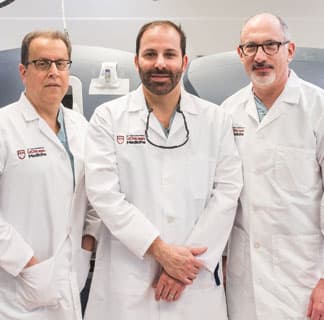Whipple surgery offers hope and potential cure for pancreatic cancer

Karen Bluemke spends as much time as possible these days soaking up the sun in Florida. After completing treatment for pancreatic cancer, she decided, it’s “time to finally have some fun.”
“Why wait for retirement?” said Bluemke, 53, a triage nurse. The west suburban woman is able to work remotely from the oceanfront condo she and her husband recently purchased.
Bluemke learned she had a tumor in her pancreas in March 2016. “The first oncologist I saw painted a grim picture,” she said. She turned to UChicago Medicine and surgical oncologist Whipple procedure, the most common surgery to remove pancreatic tumors. Unfortunately, only about 20 percent of patients are candidates for the procedure based on the stage of their cancer.
What Is the Whipple Procedure?
The team removed the head of Bluemke’s pancreas, sections of the small intestine and portal vein, her gall bladder and part of her bile duct. The remaining portions of the pancreas, bile duct and small intestine were then reconnected to restore function to her digestive tract and the portal vein was reconstructed.
UChicago Medicine is one of the few hospitals in the country that offer the Whipple procedure using both traditional (open) and minimally invasive robot-assisted techniques.
After recovering from her surgery, Bluemke underwent another course of chemotherapy, completing the treatment in December 2016.
Bluemke has regular blood tests and scans to look for signs of the cancer coming back. Posner will follow her for the rest of her life.
“All my thanks go to Dr. Posner,” said Bluemke. “What a great person to be with when you get this diagnosis.”

Experience matters
The American Cancer Society recommends patients have the Whipple operation at a hospital that does at least 15 to 20 of these surgeries a year. Surgeons at UChicago Medicine perform up to five times that many Whipple procedures annually.
Learn more about the Whipple procedure
Mitchell C. Posner, MD
Mitchell C. Posner, MD, is a leading authority in the surgical management of upper gastrointestinal cancers, including pancreatic, esophageal, liver, stomach and bile duct cancer, as well as melanoma and sarcoma. He serves as physician-in-chief of the Comprehensive Cancer Center, section chief of general surgery and chief of surgical oncology.
Read Dr. Posner's physician profile